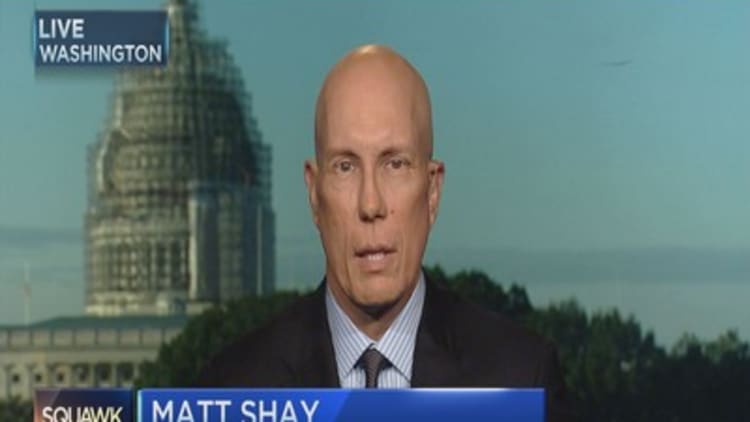If you were planning to use the upcoming sales tax holidays as a means of stocking up on your back-to-school essentials—or any other purchases for the fall season—you'd better read the fine print.
Just take a look at the rules surrounding Halloween costumes. Shoppers in states like Georgia, for example, will be able to snag theirs tax-free over the next few weeks. In some places, like Texas, that exemption applies only to children's costumes.
Even in some states where costumes are eligible, stand-alone purchases of masks—which do not fall under the apparel category—are ineligible.
Despite the complexity of sales tax holidays, which provide shoppers in participating states exemptions on certain merchandise, they continue to be a popular driver of back-to-school spending.
Take Massachusetts. Last year, traffic over its two-day tax holiday increased 23.9 percent compared to the prior weekend, while sales increased nearly 60 percent, according to RetailNext data.
Read MoreCaution lights flashing for back-to-school sales
This year, with the addition of Ohio to the mix, a total of 18 states and Puerto Rico will hold these holidays. That includes the assumption that Massachusetts, which traditionally waits until the end of July to make its decision, will once again participate.
"What retailers often do is they will put on additional promotions that surround or [are] at the same time as the sales tax holiday," said Charles Maniace, director of tax research at Sovos Compliance. "They sweeten the pot a little bit and that really drives the traffic."
Each state offers shoppers its own specific savings, which typically fall over the course of a weekend. In Mississippi, for example, footwear or clothing items that cost less than $100 are exempt. Virginia offers similar exemptions, and also provides a break on school supplies under a $20 threshold. In addition to these traditional back-to-school related savings, the state also eliminates sales tax on certain good-for-the-environment or hurricane preparedness products.
Read MoreNRF revises down retail sales forecast
Because qualifying purchases vary so much by state—sometimes evolving from one year to the next—it can be incredibly difficult for consumers and retailers to keep track. For instance, Virginia this year added hand sanitizer and tissues to its exemption list, "essentially treating them as a school supply," Maniace said.
"The line between what's an eligible product and an ineligible product is very thin," he said.
Despite the complexities they bring, retailers are typically in favor of sales tax holidays, as they get consumers excited about shopping, Maniace said. Just because they're popular with consumers, however, doesn't mean they're without controversy.
Maniace said there were "quite a bit of politics" going on this year in states like Massachusetts and Louisiana, which traditionally hold sales tax holidays. Louisiana ended up passing the legislation, while approval is expected to come later this month in Massachusetts.

Economics are at the heart of much of the debate. Before Ohio decided to adopt its first sales tax holiday, an analysis by the University of Cincinnati's Economics Center made the case that the total savings from such an event would inject $78 million into the state's households.
Research by the nonpartisan Institute on Taxation and Economic Policy, however, contends that increased sales during the tax holidays "have been shown to be primarily the result of consumers' shifting the timing of their planned purchases."
That organization estimates sales tax holidays will cost states $300 million in 2015.
"A two- to three-day sales tax holiday for selected items does nothing to reduce taxes for low- and moderate-income taxpayers during the other 362 days of the year," ITEP said in its report. "In the long run, sales tax holidays leave a regressive tax system unchanged, and the benefits of sales tax holidays for working families are minimal."
Read MoreRetail sales forecasts: Something doesn't add up
Along those lines, North Carolina last year ended its participation in a sales tax holiday, opting instead for an income tax cut. State Rep. David R. Lewis told CNBC at the time that the move "more than offsets the one-time savings obtained during promotional sales tax holidays."
North Carolina is once again sitting out from the event.
"We still believe that the savings most families are seeing in their paychecks throughout the year outweigh an administratively complex sales tax free weekend," Lewis said.
Proponents of sales tax holidays argue that states make up for lost revenue when consumers purchase nonexempt items, or use the money they saved to make incremental purchases.


